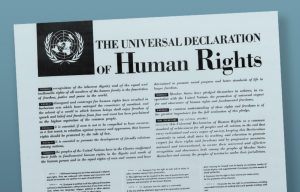From the website of the Harvard Kennedy School:
 Q: In simple terms, what defines a human right?
Q: In simple terms, what defines a human right?
A human right is a right that every human being has, regardless of the cultural and political context they belong to and regardless of the state where they live. It’s a right that they have independently of any such context.
Q: Where did the notion of universal human rights come from?
It goes back really thousands of years. Basically, once you have cultures where people are thinking about morality, you have people thinking about how to treat each other. Then at some point they come to the realization that the people who live on the other side of the river, or on the other side of the mountain, are really not that different from themselves. Their thinking then moves towards articulating some standards of universal morality.
The idea of universal rights is a more recent story and has a more specifically Western trajectory. There are corresponding versions in other cultures too, but the idea that individuals were protected in certain ways was a very strong cultural feature of Christian thinking in the Middle Ages. That way of thinking continued to evolve during the Enlightenment and found expression, for example, in the American Declaration of Independence and the French Declaration of the Rights of Man and Citizen. In the 1930s and the 1940s there was basically a merging of this ancient talk about universal morality with this more recent talk about individual rights and it culminated in the Universal Declaration of Human Rights in 1948.
More here.
